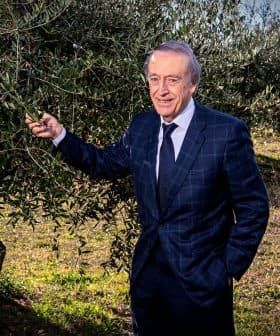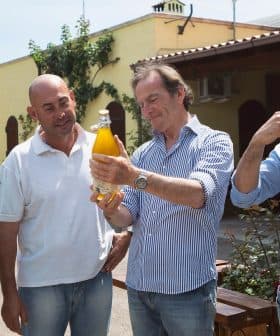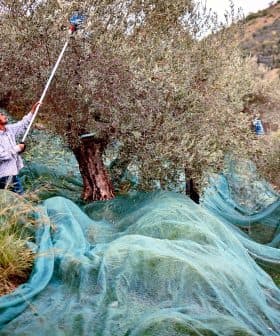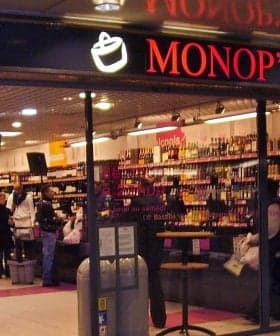Gregg Kelley's Long View: 'Quality Drives Consumption'
Under the leadership of Gregg Kelley, California Olive Ranch’s revenues have skyrocketed from $2 million to an anticipated $80 million by the end of 2015, making their extra virgin olive oils the fourth largest-selling brands in the United States. Kelley’s focus on long-term growth involves looking for additional ground in California, utilizing mechanical harvesting to keep costs down, and reaching diverse retailers such as Whole Foods and Walmart to make high-quality olive oil accessible to a wide range of consumers. Despite challenges in the industry, Kelley remains optimistic about the future of the olive oil business and the shift towards higher quality products.
It’s a startling statistic. In just eight years since Gregg Kelley took over as CEO at California Olive Ranch (COR), the company’s revenues have rocketed from $2 million to an anticipated $80 million by the end of 2015. “When I started,” he told Forbes magazine recently, “we had one grocery store. Now we have well over 20,000 retailers.” Under Kelley’s leadership, the company’s extra virgin olive oils, which include those under the COR label together with Lucini Italia, which Kelley acquired in January of this year, are now the fourth largest-selling brands in the United States.
Managing this kind of growth calls for a pro-active stance. “Our key challenge is supply,” he said to Forbes. But how will he meet the demands of such a booming business? Are further acquisitions on his radar? Will he reach out to other U.S. states as possible supply points?
We have far more in common than we have competition.
“We have enough land and resources here in California to satisfy the present demand,” he told Olive Oil Times. “You’ve got to remember that we’re operating with a view to the long term: It’s the five‑, ten- and twenty-year cycle we have to consider. So we are always looking through a telescope, trying to anticipate where we will be five years from now and evaluating all the variables.
“Though we’re always (considering) the industry globally, and we’re very pleased with our acquisition of Lucini — a great brand — our focus is clearly on California right now. We’re looking for additional ground here.” And the company is always talking with others in the industry. “We will consider both foreign and domestic acquisitions down the road, but the key (would be) that they are top-quality producers.”
One of the many ways Kelley keeps costs down is by mechanical harvesting of his high-density groves, which saves the company thousands of dollars per acre. The process is also championed by other New World producers including Chile, Argentina, South Africa and Australia, whose Boundary Bend — another fast-moving company with a skyward trajectory — recently set up shop near Sacramento.
With supply a possible concern down the road, Kelley feels confident that he won’t be competing for growers and, in fact, hails his new neighbors as being a positive for the industry at large.
“It’s a sign of the health of our industry to see such great product coming out of Australia. We’ve talked with them for years. I like their approach. They’re great people producing fantastic olive oil. But as far as competition, we’re not too concerned. We have excellent, long-term relationships and partnerships with our contracted growers. We’re far more concerned with what’s going on with the crops, in combination with the goals for our financial funds. Those two factors have a far greater impact on our business than competition,” Kelley said.
“In this grand industry, we’re tiny. With what we’re doing with COR, how we respond to the land and the environment here and how we deal with things like the drought mean we have far more in common than we have competition.”
While some in the industry are frustrated by what seems like a sluggish rate of adoption of olive oil in America, Kelley feels progress has been solid. “We don’t think we’re moving too slowly at all,” he said. “We’ve been very pleased with our growth and that of the California industry. It’s all about the perception of the viewer. It’s just a category that needs consistent innovation for improving the quality of the product that’s out there. We’ve focused on the health benefits, the taste — we work directly with chefs and both the COR and Lucini brands are a trusted source of olive oil because of consistent quality. We think our brands are prime examples of why the industry has grown as significantly as it has over the last ten years. Quality drives consumption.”
Increased consumption hasn’t happened in a vacuum, however, and Kelley says a concerted effort on the part of his company to “get the product on people’s tongues” has been primary. To achieve that in a broad sense means producing a product at price points that make buying the good stuff palatable.
The reality, Kelley believes, is that until the last five to eight years, the majority of American consumers had never tasted really true extra virgin olive oil, and offering a quality product at a reasonable price has removed some of the risk for consumers who are ready to try it.
“We’re blessed with a production infrastructure that allows us to put a high-quality olive oil on the market at a very competitive price,” Kelley explained, and that includes selling it through vastly diverse retailers — Whole Foods and Walmart for example.
“Withholding our product from parts of the market is not a sound strategy. Both retailers offer an important demographic. We need to be everywhere and give everybody access to it. That’s the crux of what we’re trying to do — using different strategies to reach different niches, and our products do very well at both.”
With quality Kelley’s primary mantra, what does the CEO say about the controversies that persist in the international arena for the sector?
“As far as the International Olive Council goes, we don’t spend a whole lot of time concerned about its activities. Of course, we keep up with them and with what’s going on there, but (the U.S.) is not a member and I don’t believe we ever will be. There are challenges they will have to confront and it’s up to them to decide if they’re going to be supportive of a progressive industry constantly seeking to provide best the experience to the consumer.”
Kelley is well aware, he said, that in the eyes of consumers, the olive oil industry has some ground to cover before it will be free of its long-established associations with shady practices and slippery scams.
“I think everyone in the olive oil business understands that ours is an industry that’s imperfect,” he said. “The challenge is that it’s an expensive product to produce, regardless of grade, and it invites a lot of game playing, with the profit motive in mind. The biggest challenge the industry faces is not so much the counterfeiters themselves, but the experience robbed from consumers. Many of us around the world are putting a higher quality product out there and letting the consumer decide — and the consumers are becoming aware.
“Once you taste better quality olive oil, you know what you’re looking for. The shift will occur over decades, not overnight, but if we sit back and look at what’s happening in the industry, you’d be surprised at how much movement has occurred in the last 10 to 30 years. It’s all changing for the better. I’m very optimistic and think we should feel pretty good about where we’re going.”









